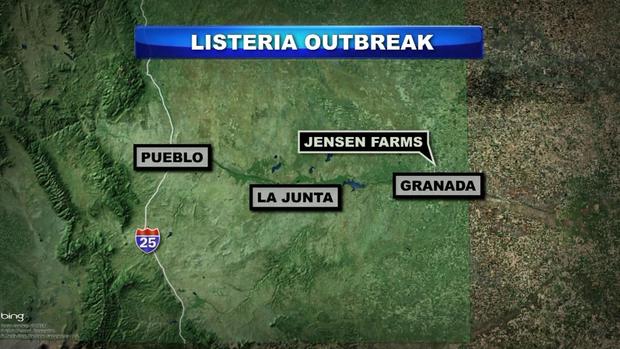Melon Growers Rebounding After Outbreak
ROCKY FORD, Colo. (AP) - Nearly a year after tainted cantaloupes from southeast Colorado sickened hundreds and caused a nationwide melon scare, farmers in Rocky Ford are celebrating a strong crop and high prices.
But the effects of last year's listeria outbreak are still being felt by people who grow the melons with a distinct sweetness thanks to the area's hot, sunny days and cold nights.
This year's cantaloupe crop is a fraction of what last year's was, when some 2,000 acres in the Arkansas River Valley were growing cantaloupes. This year, the number is about 300 to 350 acres, according to state estimates.
Still, growers around Rocky Ford are celebrating their crop's fragile recovery. Because of the smaller crop, prices are higher, from about $13 per box of 8-10 melons last year to $16 or $17 for the box this year.
In Rocky Ford, the southeast Colorado town that gave the sweet melons their name, residents are cheering the melon crop and hoping for better times. Politicians and growers competed in a cantaloupe-eating contest, and an overflowing truck of the melons met with loud applause this week in a parade celebrating the high point of the season. Roadside stands selling cantaloupes and watermelon were doing a brisk business.
"Everything that's been planted has been sold," said Diane Mulligan, spokeswoman for the 15-farmer Rocky Ford Growers' Association. The trade group was created after the outbreak.
The farmers spent nearly $1 million on safety upgrades for melon production.
First, the farmers copyrighted the name Rocky Ford - an important step because the source of the outbreak was 90 miles from Rocky Ford but was using the name.
Then, the farmers overhauled their production practices to restore public confidence. They hired a full-time food safety manager to monitor melon-picking and started paying the seasonal pickers by the hour, not by the amount of cantaloupes picked. The farmers also built a new central packing shed where all Rocky Ford-labeled melons will be washed with soap and a chlorine oxide, then rinsed with well water tested for contamination.
After being washed, the melons are cooled to reduce condensation and then packed into boxes labeled with codes traceable to the fields where the melons were grown. The boxes are packed with slips that interested shoppers can scan using a smartphone to read about where their melons originated.
The Food and Drug Administration said last year that melons at Jensen Farms likely were contaminated in the operation's packing house. The FDA concluded that dirty water on a floor and old, hard-to-clean equipment probably were to blame.
A retired melon grower in Rocky Ford, Dan Aragon, said his heart sank last year when he saw his neighbors struggling after the listeria outbreak killed 30 people. Watching people at a watermelon seed-spitting contest in Rocky Ford Saturday, Aragon said he was proud that today's growers tackled safety concerns and didn't give up on the sweet melon.
"They're doing the right thing, saving Rocky Ford. It's been good to see," Aragon said.
LINK: Rocky Ford Growers' Association
- By Kristen Wyatt, AP Writer
(© Copyright 2012 The Associated Press. All Rights Reserved. This material may not be published, broadcast, rewritten or redistributed.)




